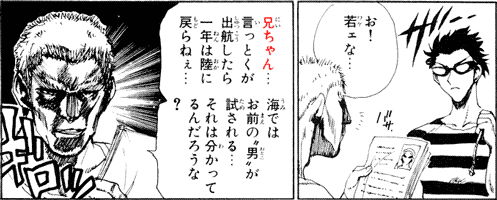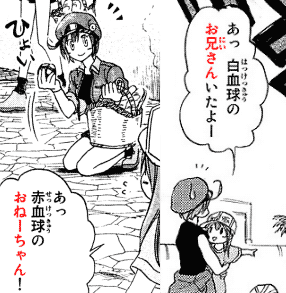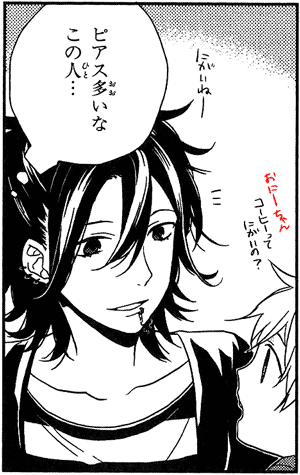In Japanese, oniisan お兄さん means "older brother," and sometimes refers to a young man. It's also romanized onīsan, with a macron for the long vowel.
The younger counterpart is otouto 弟, "young brother." The female counterparts are oneesan お姉さん and imouto 妹, "older sister" and "younger sister," respectively.
Kanji
The word oniisan is normally written with kanji, as お兄さん.
The kanji of oniisan means "older brother," ani 兄.
Sometimes, oniisan is spelled with hiragana instead, as おにいさん, or おにーさん, specially if it's a small child saying it, due to aesthetics.
Variants
With family words in o__san お〇〇さん pattern, the o~ お~ prefix can be removed, and the honorific suffix can be changed between ~san ~さん, ~chan ~ちゃん, and ~sama ~さま.
The affixes o~ and ~sama can be spelled with kanji for added formality. This rarely happens, however.
| o~ Default. |
∅ Relaxed. |
|
|---|---|---|
| ~sama Respectful. Distant. Formal. |
oniisama お兄さま おにいさま おにーさま お兄様 御兄様 |
niisama 兄さま にいさま にーさま 兄様 |
| ~san Default. |
oniisan お兄さん おにいさん おにーさん |
niisan 兄さん にいさん にーさん |
| ~chan Chummier. Diminutive. |
oniichan お兄ちゃん おにいちゃん おにーちゃん |
niichan 兄ちゃん にいちゃん にーちゃん |
| ∅ Relaxed. |
onii お兄 おにい おにー |
nii 兄 にい にー |
Beware: the word oni 鬼 refers to a sort of demon instead.
Meaning
The word oniisan means "older brother," "elder brother," in the sense of someone who is your brother, and who is older than you.
It doesn't mean "oldest brother." If you have two older brothers, they're both oniisan for you.
- {ichiban ue no} oniisan
一番上のお兄さん
The older brother [that] {is most above}. (literally.)
The oldest older brother. - choukei
長兄
Eldest brother.- nagai
長い
Long. (distance, time.)
- nagai
- chounan
長男
Eldest son [of a family].
The word oniisan is sometimes translated to English as "big brother," or oniichan as a chummier "big bro." The size of your brother has nothing to do with word. Your oniisan can be smaller than you.
- {ooki na} oniisan
大きなお兄さん
A {big} oniisan.
Toward Young Men
In Japanese, some family words can be used to refer to random people whom aren't actually related to you. The word oniisan can refer to a random "young man."
This is similar to how you can call a random old man a "grandpa," in Japanese, too: ojiichan おじいちゃん, even if he isn't your grandfather.
The diminutive variant, oniichan, can sound patronizing or intimate, e.g. if you have a character who is with a gang, mocking some random young man while trying to extort money from him, he's probably going to call the young man oniichan.
- Context: Harima Kenji 播磨拳児 goes join a ship crew to sail the seas.
- o! wakee na...
お!若ェな・・・
Ooh! Young, [aren't you]...
- wakai
若い
Young.
- wakai
- niichan... ittoku ga shukkou shitara ichinen wa oka ni modoranee...
兄ちゃん・・・言っとくが出航したら一年は陸に戻らねぇ・・・
Kiddo... [let me warn you], after [we] set sail, [we] won't be back shore in [at least] one year.- Young man, kiddo, etc.
- ~toku ~とく - contraction of ~te-oku ~ておく.
- umi dewa omae no "otoko" ga tamesareru...
海ではお前の“男”が試される・・・
In the sea, your "man" will be tested...
- In the sense of how much of a man he is, i.e. if he's man enough to brave the seas, or if he'll chicken out.
- See also: otoko 漢, quotation marks.
- sore wa wakatteru-n-darou na?
それは分かってるんだろうな?
[You] understand that, [right]?- ~teru - contraction of ~te-iru ~ている.
- giro'
ギロッ
*glare*
In anime, it's typical for a high school boy character to get called oniisan by some random little kid. It makes sense to think of this like this: if the kid had an older brother, he would be around the same age as that boy, so the boy is like an oniisan (in age) for the kid.
- Context: a "platelet," kesshouban 血小板, drawn as a cute anime girl, referring to other cells.
- a', {hakkekkyuu no} oniisan ita yo!
あっ 白血球のお兄さんいたよ!
Ah, big brother {white blood cell} [is over there]!
- a', {sekkekkyuu no} oneechan!
あっ 赤血球のおねーちゃん!
Ah, big sis {red blood cell}!
Honorific
The word oniisan can be used as a honorific suffix after someone's name. Doing this calls the person an oniisan.
- Context: the speaker confidently talks about how amazing Jun was.
- {Jun-nii no koukousei φ yatta} koro wa
淳兄の高校生やったころは
Around the time {brother Jun [was] a high school student}. - sorya mou
そりゃもう
"That [was] already"- Expression used to assert something was incredible.
- {kakkou yoka nante} mon janakatta desu yo
格好よかなんてもんじゃなかったですよ
Not something {[you'd call just] cool}.- He was more than just cool.
- Note: this is kyuushuu dialect. In which i-adjectives sometimes end in ka instead.
- kakkou yoka 格好よか
kakkou yoi 格好よい
kakkou ii 格好いい
Cool.
- kenka mo meppou tsuyokashi
ケンカもめっぽう強かし
In fighting, too, [he was] extremely strong.- tsuyoka 強か
tsuyoi 強い
Strong.
- tsuyoka 強か
- atama mo yokashi
頭もよかし
[He was also smart.]- atama ga yoka 頭がよか
atama ga yoi 頭がよい
atama ga ii 頭がいい
"Head is good."
To be smart.
- atama ga yoka 頭がよか
vs. Ani
The difference between oniisan and ani 兄, which also means "older brother," and has the same kanji but they're read differently, is that oniisan has honorifics, but ani does not.
Since you don't use honorifics toward yourself, when talking to other people about your family, you use ani 兄 to refer to your older brother, and oniisan お兄さん to refer to their older brother.
However, when talking to your own family, oniisan refers to your own older brother.




No comments: